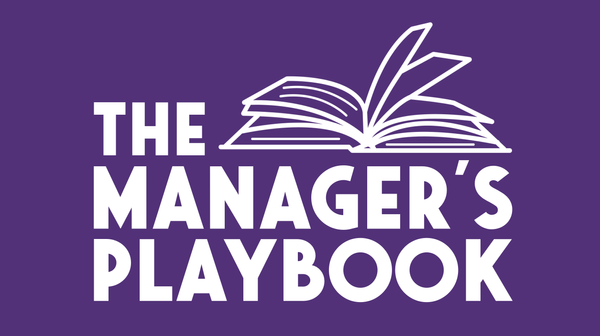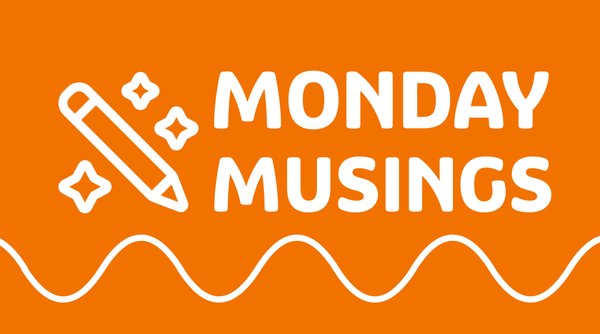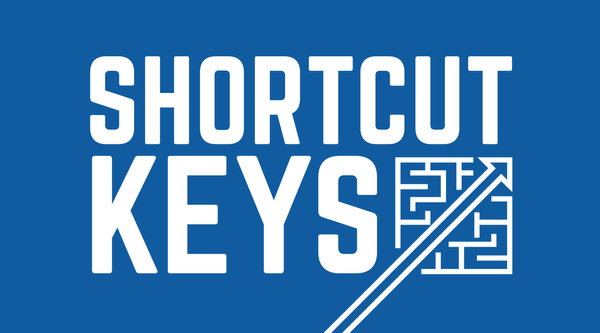6 Books to Kickstart Your 2024

Happy New Year!
It's the first week of January, and for many folks, it's a time to reflect on what they've done and what they want to do next.
What are your traditions for the new year? Do you set New Year's resolutions or intentions for the year? Do you reflect on your past year and what you've achieved? Do you look ahead and think of what's next for you?
I usually take some time to reflect on what I've done and what I want to do next, and come up with some higher-level goals (similar to what I describe in my post about brainstorming life and career goals). I've noticed, though, that over the years, the way I approach my goals, my development, and my learning has changed a lot, mostly because of various books I've read. Certain books have helped me see a different perspective of myself and have taught me different ways to approach my own abilities, experiences, and development. I keep these books always in mind whenever I start reflecting on what's next for me, and this year is no different.
So here's a round-up of books that I hope will help you kickstart your 2024! I'm hoping these books will help you reflect on what you want to do next and how you approach your learning and development this year.
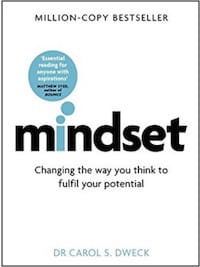
Mindset by Carol Dweck
I wish I had read Mindset by Carol Dweck much earlier in my life. In it, Dweck describes the concept of two types of mindsets: the fixed mindset versus the growth mindset.
The fixed mindset is the belief that your abilities are set in stone – you believe that you can learn new things, but that you can’t change how smart, social or sporty you are. The growth mindset, on the other hand, is the belief that your basic abilities are things that you can change – people might differ in initial interests, temperaments and aptitudes, but everyone can change and grow through application and experience.
When I read this book, I had already switched from a fixed to a growth mindset. But for years, I had a fixed mindset about certain abilities, and it stopped me from doing things I just thought were not meant for me, like public speaking. Rather than thinking "You know what, let's give it a try" or "Let's see if we can do better here," I would not even attempt to change myself because I thought I wasn't able to. This didn't apply to all my abilities: it's just certain areas where I believed I wouldn't be able to change.
Switching to a growth mindset helped me realise that I could get better at public speaking. This was something that I was going to be able to do, but I had to slowly work towards it and figure out what worked for me. Having gotten comfortable with public speaking, I've since gone on to take improv classes and singing lessons: you can teach yourself anything if you believe you can.
When looking ahead to a new year and thinking about your own goals and areas for improvement, it is helpful to understand what your mindset is about your abilities. Understanding whether or not you have a fixed or growth mindset about a certain ability or skill will help you figure out how to improve in that area.
Favourite quote: “This is something I know for a fact: You have to work hardest for the things you love most.”
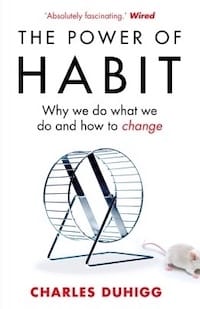
The Power of Habit by Charles Duhigg
I love the book The Power of Habit by Charles Duhigg. As the title says, it’s all about habits - it doesn’t just look at the habits of individuals, but also the habits of organisations and societies.
I think when people hear the term “habits”, they immediately think of things like exercising more, eating healthier or waking up earlier. But there are things that you do in your jobs that are ingrained in you that are habits as well.
Duhigg describes the concept of the habit feedback loop. First, there’s a cue: a sign or trigger that we need to do something. Then, there’s the routine: the behaviour or thing you want to do. Finally, there's the reward: that moment to celebrate that you did something.
Understanding how this loop works and how you can recognise it and apply it to yourself is one of the main things that has helped me change my behaviours and achieve certain goals. I've applied the habit loop to the way I approach my exercising (if I use Zombies Run, I motivate myself to exercise more often, cause I want to hear the next episode) to how I've made time for reading.
Favourite quote: "For a habit to stay changed, people must believe change is possible."
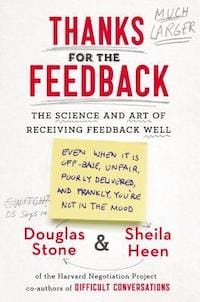
Thanks for the Feedback by Douglas Stone and Sheila Heen
The third book is called Thanks For The Feedback by Douglas Stone and Sheila Heen. It’s written from the point of view of being able to hear and take in feedback, and understand the various triggers that might make you react to and dismiss feedback. It then looks at different techniques to help guide your feedback conversations and help understand your feedback better.
I thought I was quite open and understanding about receiving feedback, but a few years back I read this book, right before I got some feedback and I noticed myself reacting and dismissing some things in exactly the way the book said I would.
Understanding your triggers with feedback will help you identify and understand what areas you might want to change about yourself and help you accept more feedback from others.
Favourite quote: "Identity is the story we tell ourselves about ourselves - what we're like, what we stand for, what we're good at, what we're capable of. When feedback contradicts or challenges our identity, our story about who we are can unravel."
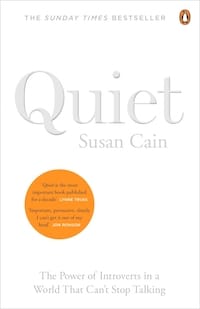
Quiet by Susan Cain
I’ve always considered myself a massive introvert. Another book I wish I had read much earlier in my life is Susan Cain’s Quiet, cause she explains the differences between introverts and extroverts, and shows the way our society is built around extroversion.
Regardless of whether you’re an introvert or an extrovert yourself, reading this book will give you a better understanding of how our brains process the information in the world around us and how that can affect each person in different ways.
Favourite quote: “Everyone shines, given the right lighting.”
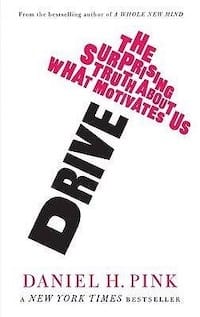
Drive by Daniel H. Pink
The next book on this list is Drive by Daniel H. Pink. In it, he examines the intrinsic rewards that people seek, rather than extrinsic awards like money or owning stuff. It’s backed up with a lot of research examples and case studies, and it got me thinking about why I do the things that I do.
Pink identifies three different underlying motivations for people:
- Autonomy: the desire to be self-directed. This is about understanding what parts of your life you like control over. What are the parts of your life, your work that you want to be able to decide on?
- Mastery: The urge to get better and better at something that matters to you.
- Purpose: The desire to do something that has meaning to you and is important. What difference do you want to make to the world?
So what motivates you? Keeping autonomy, mastery and purpose in the back of your mind, what are the things that drive you and keep you happy? If anything here immediately springs to mind that you’re not already doing yet, then that should be one of your goals.
Favourite quote: “People use rewards expecting to gain the benefit of increasing another person’s motivation and behaviour, but in so doing, they often incur the unintentional and hidden cost of undermining that person’s intrinsic motivation toward the activity.”
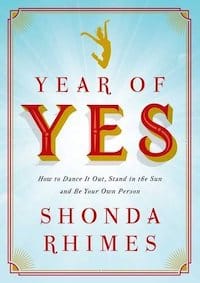
Year of Yes by Shonda Rhimes
The final book I would recommend is Year of Yes by Shonda Rhimes. “You never say yes to anything”: these six words prompted Rhimes to start a year of saying yes to things and her story is inspiring to read.
I love this book cause I did a similar thing in the same year that Rhimes did it (2014). I didn't say yes to every single thing that came my way, but I actively tried to say yes to the things that scared me and that usually I would say no to. In that year, I got to do multiple things that I otherwise wouldn't have done: I gave my first conference talk, I started speaking up more at work, I took on more responsibilities and eventually, it led to me becoming an engineering manager. I can honestly say that without my own year of yes, I wouldn't be doing what I do today.
Favourite quote: "Ditch the dream. Be a doer, not a dreamer."
I'm hoping these 6 books will help you kickstart your 2024! Each of them has changed me and my perspective in different ways, and am hoping they'll do the same for you.
What books have inspired you? What books have changed the way you see certain things? I'd love to hear what books have changed your life!
